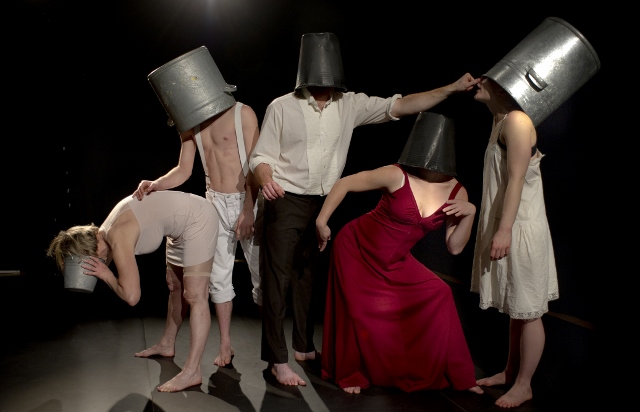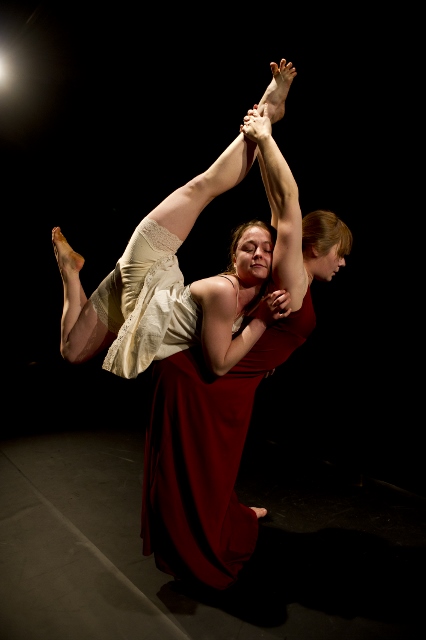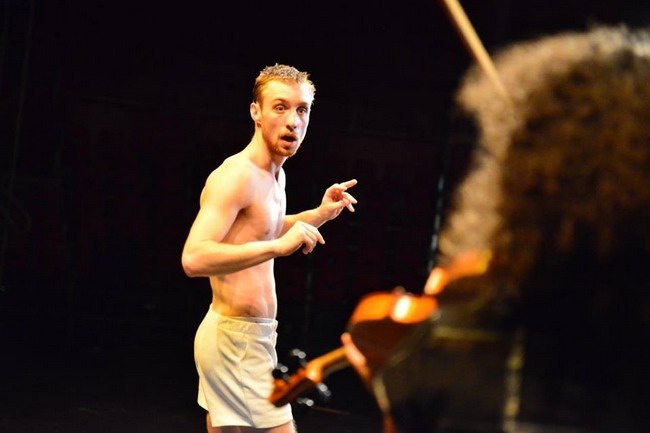Pink Pepper Pleasantly Spiced up Letní Letná
 Letní Letná is a well-established festival in its own right, held in Prague annually at the end of the holiday season. Every year features a series of performances for children, open air events, concerts and workshops. Remarkable new circus ensembles from the Czech Republic and the rest of the world alike present their work here, headlined by Cirque Trottola, who have sold out all their performances in the past and this year seems to be no exception. One of the leading stars of the eleventh year of the festival are La Compagnie du Poivre Rose, who, accompanied with the live music of Iva Bittová performed a world premiere of the production
Le Poivre Rose (Pink Pepper).
It is hard to say what exactly the audiences expect from a performance like this. Perhaps they are familiar with Iva Bittová and her work and know that quality is guaranteed here, because everything this singer and violinist embarks on turns out to be a success. Or do they choose what performance to attend just on the basis of annotations that do not say much about individual shows anyway? Or maybe it is just "appropriate" to go to Letní Letná once at least and pick one of the main attractions. Whatever the motivation for this choice was, no one was disappointed in the end.
Letní Letná is a well-established festival in its own right, held in Prague annually at the end of the holiday season. Every year features a series of performances for children, open air events, concerts and workshops. Remarkable new circus ensembles from the Czech Republic and the rest of the world alike present their work here, headlined by Cirque Trottola, who have sold out all their performances in the past and this year seems to be no exception. One of the leading stars of the eleventh year of the festival are La Compagnie du Poivre Rose, who, accompanied with the live music of Iva Bittová performed a world premiere of the production
Le Poivre Rose (Pink Pepper).
It is hard to say what exactly the audiences expect from a performance like this. Perhaps they are familiar with Iva Bittová and her work and know that quality is guaranteed here, because everything this singer and violinist embarks on turns out to be a success. Or do they choose what performance to attend just on the basis of annotations that do not say much about individual shows anyway? Or maybe it is just "appropriate" to go to Letní Letná once at least and pick one of the main attractions. Whatever the motivation for this choice was, no one was disappointed in the end.A large circus tent with the main auditorium and two side wings up to their halves reserved for this show, stage facing the main auditorium, is almost sold out. Out of the darkness we can hear the distinctive voice of Iva Bittová, who slowly comes out of the auditorium onto the stage and starts to sing and play. Only few spots on the stage are lit, sometimes the spotlights briefly focus on individual performers, emerging from the darkness. The scene is empty apart from a big tin barrel, into which water drops. Actually, the motif of tin buckets, tubs and cooking pots reappears throughout the whole performance as one of its unifying elements. At the beginning there is even a light built in one of the buckets, so the performers can move it like a giant torch to light up individual objects.
 Soon we get to see all the performers, two men and three women, a group of acrobats from Canada, France and Belgium. Women are represented by an elderly lady (Antoinette Chaudron) who is the mother of one of the men, a girl - daughter (Valérie Doucet) and another girl (maybe maid?) (Claudel Doucet). The men are somewhat contrasting characters, a young "dandy" (Amaury Vanderborght), who would be today perhaps described as a metrosexual, because everything he does he does just for effect, it is obviously important to him to look good at any time, he likes himself very much.
His antithesis is a tall man dressed in a jacket, corduroys and stockings, who seems to be a rather slow and clumsy person (Thomas Dechaufour). It can not, however, be said that any of the characters is more likeable than the rest, all of them are quite balanced and no one plays bigger part than the others. And then starts the story, which consists of individual numbers, mostly solos and duets, apart from the last scene we can rarely see all the performers on
stage at the same time. Physical acts on a rope and a circus pole are followed by other numbers, such as mother's drumming on buckets made up as an improvised drum kit and a "ballet" performance of mother and a tall man, who lifts her on his shoulders high above the ground while climbing the pole. Most of the numbers are comical or making the audiences smile at least. Bittová’s music, mostly performed live on the violin, huge wind chimes hanging on the stage or just by stamping on a bucket or singing, is a delicate part of the production. Although apart from a new material conceived specifically for this show some older songs were used too, the movement and the music perfectly complement and react to each other. Most of the songs are in Czech language, some pieces of lyrics illustrate the scene as well.
Soon we get to see all the performers, two men and three women, a group of acrobats from Canada, France and Belgium. Women are represented by an elderly lady (Antoinette Chaudron) who is the mother of one of the men, a girl - daughter (Valérie Doucet) and another girl (maybe maid?) (Claudel Doucet). The men are somewhat contrasting characters, a young "dandy" (Amaury Vanderborght), who would be today perhaps described as a metrosexual, because everything he does he does just for effect, it is obviously important to him to look good at any time, he likes himself very much.
His antithesis is a tall man dressed in a jacket, corduroys and stockings, who seems to be a rather slow and clumsy person (Thomas Dechaufour). It can not, however, be said that any of the characters is more likeable than the rest, all of them are quite balanced and no one plays bigger part than the others. And then starts the story, which consists of individual numbers, mostly solos and duets, apart from the last scene we can rarely see all the performers on
stage at the same time. Physical acts on a rope and a circus pole are followed by other numbers, such as mother's drumming on buckets made up as an improvised drum kit and a "ballet" performance of mother and a tall man, who lifts her on his shoulders high above the ground while climbing the pole. Most of the numbers are comical or making the audiences smile at least. Bittová’s music, mostly performed live on the violin, huge wind chimes hanging on the stage or just by stamping on a bucket or singing, is a delicate part of the production. Although apart from a new material conceived specifically for this show some older songs were used too, the movement and the music perfectly complement and react to each other. Most of the songs are in Czech language, some pieces of lyrics illustrate the scene as well.Changes in pace and the overall structure of the production work together with the music quite naturally, everything flows nicely and there are no obvious pitfalls. One of Iva Bittová’s qualities that is clearly demonstarted here is that she does not draw attention to herself, she rather leads the actors through the production, at some points she "spurs" and pok es them with her music, yet she still keeps the overall shape of the production.
One of the numbers explicitly refers to the subject matter of this piece that was described in the abstract, which claims that it "examines the role of women and men in the contemporary world." It is a scene in which a woman – servant places a safety mattress for acrobatics on a trapeze, which she then performs with the "dishy" guy. In this number the roles are swapped. The woman is the one who supports her male counterpart and does all the hard work, although she would like to enjoy the movement as well, she is there to support him and be the base point of their performance, whereas the man sings while performing his acrobatics, swaggers, strikes some spectacular poses and even manages to adjust his white shorts. This was not the only time in the performance that every stunt was rewarded with applause and laughter from the audiences.
 The partner support is referred to in the following number as well, where a girl gets both her legs fixed by stirrups holding some kind of splints in such a way that she cannot bend her
knees. The girl with this movement restriction then performs some incredible moves (which is even more incredible in the videos and photographs from rehearsals where she has her right arm in a plaster cast) that resemble dance, especially at the end of the scene when she is accompanied by a tall man, who has, for a change, a similar splint fixed from his head to his leg. Their mutual movement is a peculiar dance that makes their shared handicap look not so hard.In the final scene all the performers meet on the stage in some sort of merry-making, where everyone is mostly dancing alone with his or her arms stretched as if they embraced another person. Final tune and lyrics of a Yiddish song adapted by Bittová in the sense of "let's rejoice" along with the cheerful atmosphere of most of the production left a pleasant feeling of joy, hilarity and happiness that lingered with the audiences for a long time.
The partner support is referred to in the following number as well, where a girl gets both her legs fixed by stirrups holding some kind of splints in such a way that she cannot bend her
knees. The girl with this movement restriction then performs some incredible moves (which is even more incredible in the videos and photographs from rehearsals where she has her right arm in a plaster cast) that resemble dance, especially at the end of the scene when she is accompanied by a tall man, who has, for a change, a similar splint fixed from his head to his leg. Their mutual movement is a peculiar dance that makes their shared handicap look not so hard.In the final scene all the performers meet on the stage in some sort of merry-making, where everyone is mostly dancing alone with his or her arms stretched as if they embraced another person. Final tune and lyrics of a Yiddish song adapted by Bittová in the sense of "let's rejoice" along with the cheerful atmosphere of most of the production left a pleasant feeling of joy, hilarity and happiness that lingered with the audiences for a long time.Written on the performance that was part of Letní Letná festival on August 20th, 2014.
Le Poivre Rose Stage direction: Christian LucasCostumes: Sandra Dechaufour
Lighting design: Olivier GrimmeauMusic: Iva Bittová
Performers:Claudel Doucet, Valérie Doucet, Thomas Dechaufour, Antoinette Chaudron, Amaury Vanderborght


